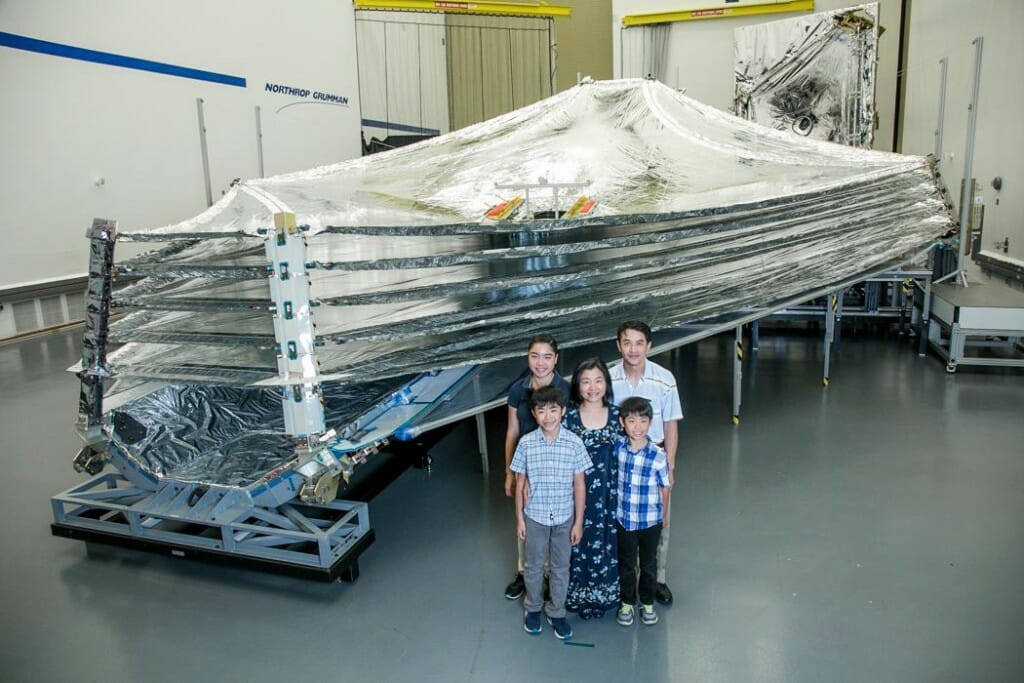UW alum helped pack James Webb telescope for space travel
A University of Wisconsin–Madison engineering mechanics alumnus made important contributions to NASA’s James Webb Space Telescope, which arrived at its home in distant orbit Monday.
The telescope, the world’s largest and most powerful space science observatory, launched on Dec. 25, starting its journey toward its destination about 1 million miles from Earth.
Webb is an international program led by NASA in partnership with the European Space Agency and the Canadian Space Agency. The telescope’s revolutionary technology will explore every phase of cosmic history — from within our solar system to the most distant observable galaxies in the early universe, to everything in between. Webb will reveal new and unexpected discoveries and help humanity understand the origins of the universe and our place in it.
Wei-Di Cheng, a 1993 UW–Madison graduate, is a stress analyst at Northrop Grumman in Redondo Beach, California, where he worked on several aspects of the James Webb Space Telescope. He analyzed mechanical ground systems to propose, design, fabricate, test and deliver ground systems to support spacecraft and payload integration.
His contributions included working on the telescope’s forward and aft unitized pallet structures, which contained Webb’s carefully folded sunshield.

Wei-Di Cheng, at right in the back row, and his family pose with palletized components of NASA’s James Webb Space Telescope in July 2019. Cheng, a UW–Madison engineering alum, helped design and test the parts of the telescope that fold and deploy the telescope’s heat shields. courtesy of Wei-Di Cheng
The ultrathin sunshield, about the size of a tennis court at full size, is essential to protect the telescope from the light and heat of the sun, Earth and moon, allowing Webb’s instruments to cool down to the extremely low temperatures necessary to carry out its science goals.
However, maintaining the sunshield’s shape as it unfolds into position involves a delicate, complicated process. Cheng played a key role in testing the unitized pallet structures to help ensure that the sunshield would successfully deploy in space.
“The unitized pallet structures are roughly three stories tall and made of a very thin and light composite material; at some points, the structure is about as thin as a few pieces of paper stacked together,” Cheng says. “So my work involved testing the structure during different configurations to make sure it would function as it needed to in space.”
Cheng says a particularly challenging aspect of the testing was to unfold the delicate sunshield in Earth’s gravity environment, which causes friction, unlike unfolding material in space without the effects of gravity.
“So we needed to adequately test the structure without imposing too much force into it and causing it to bend or break,” he says. “This had never been done before, and it was very difficult to accomplish.”
“I’m going to hang my hat on this accomplishment. I’m very proud of what our team has accomplished, and I look forward to the discoveries that will come from Webb.”
Wei-Di Cheng
The Webb team began remotely deploying the sunshield Dec. 28, and successfully completed the deployment on Jan. 4, marking a critical milestone for the mission.
In addition, Cheng worked on testing a transport container for the James Webb Space Laboratory to ensure that the laboratory could be safely transported to NASA facilities across the country for various tests.
Cheng says his UW–Madison engineering education was instrumental in his career success and enabling him to contribute to the James Webb Space Telescope.
“To this day, I’m still thankful for the solid education I received at UW–Madison, which enabled me to work on a project that will make history,” he says. “My degree helped me get my foot into the aerospace industry, and as I have progressed in my career, I have an even greater appreciation for how my UW–Madison education prepared me for success.”
Cheng, who has worked at Northrop Grumman for more than 16 years, says he’s excited to see all the work on the telescope come to fruition.
“I’m going to hang my hat on this accomplishment,” he says. “I’m very proud of what our team has accomplished, and I look forward to the discoveries that will come from Webb. It’s exciting to make a contribution to society through my work.”
